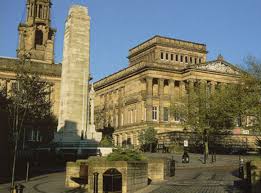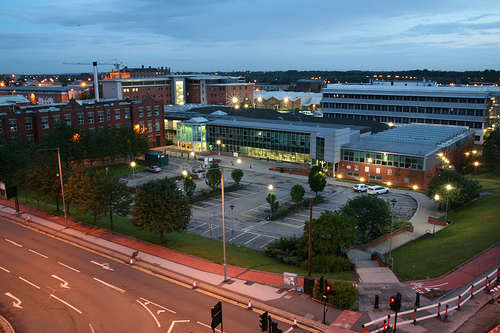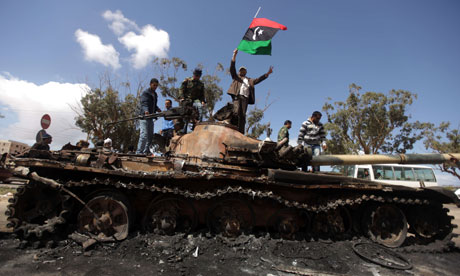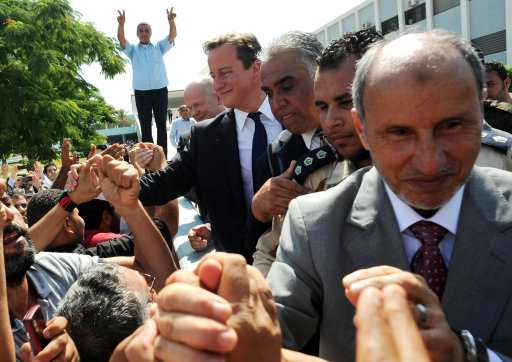Internationally Preston is not well know, even the people of Preston sometimes are known to joke about how on earth it became a city. If you live in the UK you may have heard of Preston for one of these reasons; you've heard of the University of Central Lancaster that's based in Preston, if you heard about 12 year old cage fighters or maybe Preston's bus station that was recently in the news for being an endangered historic building.
 |
| Preston at it's best, the Harris building. |
The City council has a plan to put Preston on the map. It's a new shopping complex and refurbishment of the market end of town. Unfortunately they have it completely wrong! The idea that Preston can be put on the map by building a new shopping center like say Manchester, Blackpool, Birmingham, Hull, London... and pretty much every city in the UK, is doomed to fail by its nature! We are in an economic slow down, shops are closing down throughout the country, their are boarded up shops in Preston and the project will cost billions of pounds the council don't have and they have recently lost financial backers because its a bad idea!
As if this idea didn't seem bad enough as you look deeper it gets worse, they will build this site were the bus station currently is by tearing down the bus station then building a smaller bus station further way from the train station (occurring to some reports although the plans keep flip flopping) and if you didn't know the bus station is the largest car park in Preston. We don't have a surplus of parking so why do they want to removed a large multistory car park to make room for something that will bring people into the city then leaving them with no were to go. What will bring people to Preston is something different basic common sense, never mind economics will tell you that there is a limit to the amount of revenue that can be made from shopping, any gain in one place is a loss to another. Preston needs to make itself different but the tragedy is it already is.

Recently Preston made headlines for the right reasons because one of its buildings was listed as an important monument. Preston Bus Station has just been added to the
World Monument Fund's treasured places at risk list, this list only contains 67 buildings global! Preston Bus Station is not just loved by architects,
it recently came top of the Lancashire Evening Posts most loved building in Preston. In fact, as i pointed out to the council, the Save Preston Bus Station had far more facebook likes than Preston Council's page.
The tragedy of all of this is while Preston Council fights with supports of the bus station nothing is being done in Preston, now Preston Council blame supporters of the bus station for slowing things down but actually supports of the bus station want the same thing. No body wants to keep the bus station as it is but it needs to be developed. This is the dream for the bus station:
Preston bus station concept, More at:
LinkPreston Bus Station could be incorporated into a new shopping center! A shopping centers that will catch the eye unlike the same old shinny monstrosity proposed by the council. Perhaps people will say look at this amazing building that has been brought back to life. It's better there are so many options open to the bus station to give it life! The large flat level on top would be perfect for an elevated park. The other day I saw skaters enjoying the curves of the bus stations, perhaps one of the upper levels could be a skate park? Putting to use what we have, that developing the community and putting things to good use.
We simply cannot keep the bus station because it is unique, it is a drain on finances, to bring it up to standard would cost £4 million alone! People often the quote the £700 million investment here but that isnt our money, its the developers money and they wouldn’t pay £4 million to clean up the bus station i'm afraid.
- Preston Council -Link
No they wouldn't pay for £4 million to clean it up but it's easier to get £4 million than £700 Million. Realistically of course the dream of refurbishing the bus station would cost more than £4 but it would probably cost less than £700 Million. One of the main investors was John Lewis, which is now scaling back its new operations and I think has pulled out of this project. Forget building a huge shopping center on the site of the bus station, convert it into smaller plots in which small shops can set up. Smaller shops are better for the economy than larger ones that simply put all competition out of business and it makes the project more adaptable. If one pulls out its not a loss making the project all together more adaptable.
 |
| UCLAN |
The great thing about refurbishment is that it could attract the graduate jobs Preston wants. As mentioned earlier UCLAN is on the rise attracting international attention. The problem is graduates can't find that many local jobs. An interesting building like the bus station could be what brings businesses into Preston to stay. Perhaps some of the bus station could be offices? If you left some of the many floors are parking and kept some buses running out of it, it would be an amazing place to base a business! In a city with graduates, in a building with a park on top, parking, buses on site and by using the walk ways you could get straight into the Guild Hall which would benefit from more business along with nearby markets that would of course add the attraction. An alternative option to the current project wouldn't even be too ridgid seen as there are still near buy buildings that can be demolished if needs be.
It blows the mind to think that Preston Council is pushing forward a project that costs a huge amount of money, is not popular (we need development in the city is not equal to we support the project! That is fact skewing), not as beneficial as the alternatives and results in tearing down an unique piece of architecture in return for paying an new architecture to design something which will fade away into the hundreds of 21st center shopping centers being erected globally. Dare I say the whole thing whiffs of a personal vendetta by certain members of the council. I hope the council wake and think differently! Now is not the time to simply open the first page of the city development hand book and pick out the obvious shopping centre option, we can't take Liverpool One drop it in Preston and expect all our problems to go away.
Were living in changing times, we can't live in a society built on excessive consumption and borrowing which is exactly what this project is. It's time to put the Tithebarn project to rest and for the council to practice what its preaches: Recycle!
Sign the partition


















